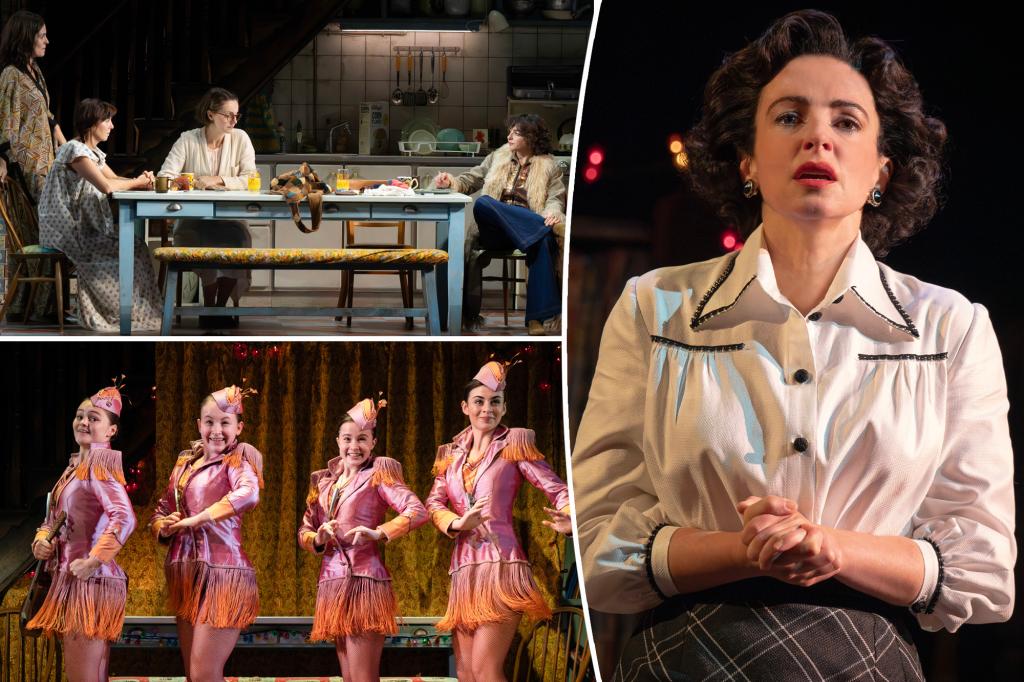Theater review
THE HILLS OF CALIFORNIA
Two hours and 45 minutes with one intermission. At the Broadhurst Theater, 235 W 44th St.
Perhaps the city should rename West 44th Street Stage Mother Way.
Between 7th and 8th Avenues at the Majestic Theatre, Audra McDonald will soon begin playing that most ferocious of performer parents, Mama Rose, in a revival of the musical “Gypsy.”
And next door at the Broadhurst, where Jez Butterworth’s new play “The Hills of California” opened on Sunday night, lives her stern British counterpart, Veronica Webb.
Like Rose, single mom Veronica forces her four daughters in Blackpool, England, to learn the ins and outs of show business in pursuit of finally escaping their shabby lives spent running a dingy hotel.
Both women are morally off-balance, and decide that sacrificing their children’s innocence for fame is worth the risk.
But there is a key difference. While deep down Mama Rose is all about No.1 — “for me… and for you!” — naive Veronica earnestly believes a music career will save her girls from wallowing in the same dissatisfying life she did.
Sorry, not gonna happen. We know because Butterworth’s play, directed by Sam Mendes, begins in 1976, when the Webb sisters are harried adults and mothers themselves — resentful, stuck and gathered together on the night that elderly Veronica will die of cancer.
Suffice it to say, Butterworth’s compelling drama starts sad and only gets sadder.
It’s not the playwright’s best (that’s “Jerusalem,” which Mark Rylance was explosive in on Broadway) or his grandest (that’d be “The Ferryman”). But “Hills” has an appealing haunted atmosphere, even if the ghosts aren’t specters, but traumas. And in its dreamy third act, the play distinguishes itself from the many, many dramas about kids caught in the web of their parent’s pipe dream.
The helpless flies are Gloria (Leanne Best), Ruby (Ophelia Lovibond) and Jill (Helena Wilson), who descend on the Sea View Hotel, a chintzy establishment with a tiki bar and Christmas lights (a “Tragedie of Fawlty Towers” set by Rob Howell), to say goodbye to their unseen mom upstairs.
Cheerful spinster Jill — selfless, stunted or both — never left home and has become Veronica’s caretaker. Ruby has a daughter of her own. And Gloria, with a husband and son, is the brand of barking, venomous matriarchs you find in American plays such as “August: Osage Country.”
Ready to take charge, Gloria introduces herself to the nurse as “the eldest,” but she’s not. That would be Joan, their estranged sister who vamoosed to California in her youth and never returned. She is supposedly en route to Blackpool.
“Hills” then whooshes back in time to the 1950s, when nanny-like Veronica (Laura Donnelly) is trying to whip her girls into an Andrews Sisters copycat group — complete with perfect harmonies, synchronous dances and shimmering costumes — in hope of being fatefully discovered and headlining the London Palladium.
The young Webbs are wonderful mini-mes, played by Nancy Allsop, Sophia Ally, Lara McDonnell and Nicola Turner.
Adding to the story’s depression, Blackpool is 250 miles away from the cultural hub of London. That remove means Veronica has never heard of rock and roll, the genre that has already made the Webb Sisters’ act obsolete.
Besides the ladies, the Sea View is populated by unreliable drunks and men who, as Sally Bowles would say, rented by the hour. None of Butterworth’s male characters are half as interesting or fleshed out as the Webbs. They’re only there, really, to illustrate what Veronica longs to leave behind.
Donnelly’s Veronica is an enthralling creation. Staunch and librarian-like, every so often the crafty woman reveals a surprising detail or fib that suggests her persona is all an elaborate act. Cold at first, tiny cracks form in her demeanor and resolve. The slightest wavering of Donnelly’s voice is emotionally mammoth. As is an acting feat she manages later on in the play.
The other adult Webbs match her intensity, even with less meaty roles. They have that timeless one-two-three dynamic that’s been everywhere from “King Lear” to Chekhov and “The Brady Bunch,” and click like an old-fashioned trio of singers — even as the musical notes are swapped for cruel barbs and curses.
Some of their flying phrases, I’ll admit, are difficult to understand. The actors commit admirably to the Blackpool accent, which can stump even those of us who are well accustomed to British brogues. It’s a situation in which, I believe, the best choice would be to ease up on the authenticity.
Butterworth, after all, has no problem with giant changes. His ending is completely different, and leagues better than when I saw the play in London in June. An unneeded, overly complicated shock has been shredded and in its place is a long-awaited, satisfying confrontation that, once again, summoned thoughts of “Gypsy.”
Through thick and through thin, all out or all in.
